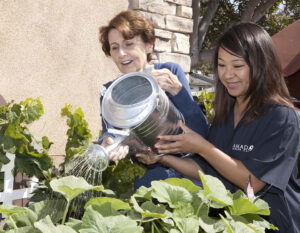To many of us, the winter season brings joy and cheer, filled with holiday festivities, family gatherings, and the excitement of gift-giving. However, it’s not jolly for everyone. For many seniors, the month is shadowed by depression, solitude, and stress.
A severe type of depression called Seasonal Affective Disorder (SAD) – also referred to as the winter blues – becomes more prominent in this month. Ironically, while SAD can affect anyone, older adults and seniors seem to bear its brunt more often. December being Seasonal Affective Disorder Awareness Month encourages seniors and their families to learn more about the signs of SAD and consider possible remedies.
Understanding Seasonal Affective Disorder in Seniors
Do you notice a significant dip in the mood either in yourself or in an elder you cherish during winter? Have you observed a decrease in their participation in activities they typically love?
SAD’s emergence is common during fall and winter, with an observable decline during sunlit seasons – spring and summer. It is essentially a form of depression, associated with lower levels of natural light, primarily due to increased indoor confinement owing to inclement weather or illness.
Researchers studying SAD posit that reduced sun exposure during these colder, shorter days results in an alteration of brain chemicals – serotonin and melatonin. The decrease in serotonin, our “happy hormone,” coupled with an increase in melatonin, produced in response to darkness, leads to lethargy and drowsiness.
Furthermore, Vitamin D, which we largely obtain through sun exposure, runs low during winter due to reduced outdoor activities. Seniors, particularly sensitive to vitamin D deficiencies, could consequently encounter a higher likelihood of SAD.
Recognizing the Symptoms of SAD in Seniors
According to the National Institute of Mental Health (NIMH), symptoms of SAD may include:
- Consistently low energy levels
- Sleep disorders, including insomnia and oversleep
- Withdrawal from social engagements
- Declined interest in hobbies
- Inability to concentrate
- Persistent sadness
- Fluctuation in weight or appetite
- Irritability or violent behavior
- Feeling hopeless or worthless
- Frequent crying spells
- Changes in personal hygiene habits
- Feelings of self-devaluation
- Thoughts of suicide or death
Understanding the Impact of SAD on Seniors
Colder temperatures and inclement weather may prompt feelings of isolation for older adults. This can exacerbate the winter doldrums. It is estimated that 15 to 20 percent of seniors aged 65 and older suffer from depression, partly due to SAD. Furthermore, seniors who have a personal or family history of depression are at a higher risk of experiencing SAD. The effects of SAD vary between older adults and seniors, with the latter bearing additional age-related risks including:
Social Withdrawal
Seniors often find fewer opportunities for interaction, especially in regions where early sunset and snow are common, thereby contributing to increasing SAD risk.
Reduced Mobility
Inclement winter weather that often brings snow and ice reduces safe, outdoor activities for seniors, further amplifying their risk of SAD.
Geographic Location
Seniors living in northern climate regions face higher SAD risks due to weather conditions restricting outdoor activities and reduced sunlight hours.
Vitamin D Deficiency
With less exposure to daylight in the winter, the body reduces production of vitamin D which is believed to promote serotonin. This heightens the risk of SAD, as serotonin plays a key role in mood and sleep.
Depression History
Seniors with a personal or familial history of depression are at a higher risk of developing SAD. Studies show that SAD is more common in seniors who suffer from major depressive disorder or bipolar disorder, and that SAD sometimes runs in families.
Assisting Older Adults and Seniors Prone to SAD
While it is of vital importance to consult a doctor when noticing symptoms of SAD, certain lifestyle measures can also help mitigate its effects. Prompt your senior loved ones to:
- Consult a doctor who might recommend a Vitamin D supplement, light therapy, talk therapy, or antidepressant medication.
- Spend quality time with loved ones and friends.
- Curb your intake of sugary beverages or products and limit alcohol consumption.
- Maintain a balanced diet rich in fruits and vegetables.
- Consume more Vitamin D-rich foods, as per your doctor’s or dietician’s recommendations.
- Engage in regular exercise
- Ensure sufficient exposure to natural light
- Adhere to a regular sleep schedule
Seasonal Affective Disorder can significantly impact older adults and seniors, but it doesn’t mean seniors have to dread winter. Seniors and their families are encouraged to learn about their own personal SAD triggers and find ways to push back against the winter blues by adopting a healthy lifestyle, staying as active as possible, and keeping in touch with family and friends.
Families and friends can help by reaching out and spend time more frequently with the beloved seniors in your life. Your presence can make all the difference in helping them experience the joys of the season. If you or a senior loved one would like to learn more about how an Amada caregiver can help provide compassionate support this winter, please don’t hesitate to speak to one of our senior care advisors. CLICK HERE to find an Amada office near you.
“Signs of Seasonal Affective Disorder in Seniors,” edited by Michelle Flores, Amada blog contributor.















